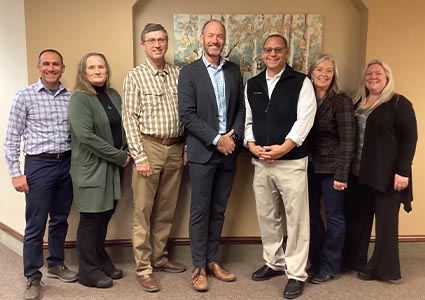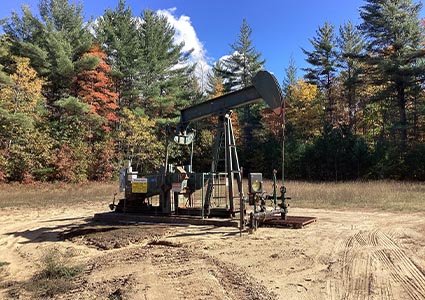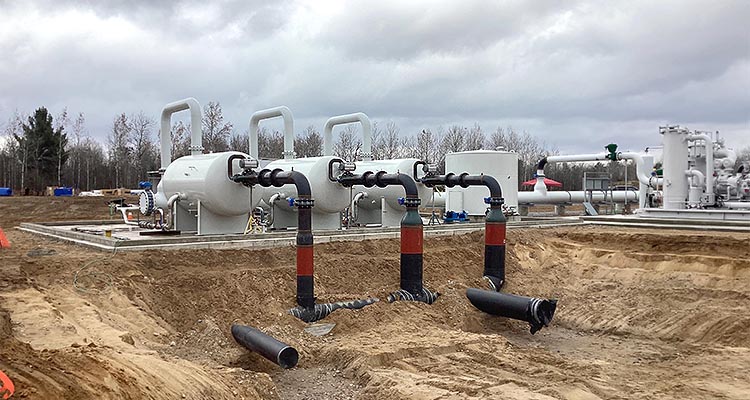Learn how Riverside Energy Group is revolutionizing the energy industry by pioneering more sustainable practices
Pairing forward-thinking innovation with industry-leading science and technology expertise, Riverside Energy Group (Riverside) is transforming the US natural gas production scene one acquisition at a time. Having been founded less than 15 years ago, the company has undergone a phenomenal journey of growth, and it continues to expand and reform the sector in its 14th year of business in 2024. With operations in Michigan, Indiana and Texas, the group endeavors to generate sustainable, long-term shareholder value by acquiring and developing production assets and advocating for more responsible management of oil and gas exploration projects in the United States.
Energy, Oil & Gas recently sat down with Rob Gerhard, Founder and Chief Executive Officer at Riverside, and Jim Schramski, Chief Operating Officer, to learn more about the company’s operations past, present and future.

“Riverside was founded in 2010 by Rob Gerhard and his partners to expand their successful mining investments business into the oil and gas space,” Jim begins. “Riverside began with exploration – leasing, shooting seismic and wildcat drilling. Later, in 2012, it acquired El Paso’s natural gas wells and substantial property acreage in Indiana. In 2016, with the support of private equity firm White Deer, Riverside purchased Chevron’s Michigan asset portfolio and immediately became the largest upstream natural gas production company in Michigan, with over 1800 operated wells and a non-operated working interest in 1000 more, principally in Michigan’s Antrim Shale natural gas play.
“With nine other acquisitions after the initial purchase from Chevron in 2016, also mainly in the Antrim Shale, Riverside has grown to produce over 55 percent of Michigan’s local natural gas supply and, more importantly, breathed decades of future life into the Antrim Shale play. Each acquisition created further potential for operational efficiencies, including gas production facility consolidations and leveraging our business systems, internal support staff and network of service providers.”
Operating efficiencies
It has been through building the leading position in the Antrim Shale that Riverside has become the number one producer of natural gas in Michigan. The Antrim Shale was developed by the likes of CMS, DTE, Atlas, and Chevron in the 1990s to early 2000s.
“Since the Chevron asset acquisition in 2016, Riverside has made nine additional bolt-on acquisitions of Antrim properties,” Rob reflects. “We were able to buy assets that were less valuable in the hands of the sellers than in our hands because of our scale and lower operating costs. From its working interests in 7000 wells and 5600 operated wells across Northern Michigan, Riverside’s daily gross sales in Michigan exceed 130 Mmcf natural gas. To put that into context: if converted to electricity, that’s enough energy to power almost 600,000 Michigan households each day. Riverside also holds over 650,000 acres in the Antrim formation and over 300,000 acres of deeper mineral rights in Michigan.”
One example is the January 2023 acquisition Riverside made of a package of natural gas assets from Trendwell Antrim Inc, which further strengthened the company’s presence in the Antrim Shale area.
“Trendwell’s Antrim units were each contiguous with at least one of our existing Antrim properties, so this pick-up of 217 wells made a lot of sense and established Riverside as the operator of over 60 percent of the Antrim,” Jim states. “The assets were absorbed within the existing operational framework, and the contract operators that were working on the assets were hired as direct employees. It may have been difficult for Trendwell to keep operating those wells profitably, but by bringing them into Riverside’s low-cost diversified stable, they will continue producing for decades.”
Transitional energy
 The upstream oil and gas sector has often been criticized for its harmful environmental impact and bad practices with land management, community and social affairs and staff safety. Riverside, however, has built on Chevron’s world-class practices of highly responsible stewardship of natural resources, attention to safety practices and generous community engagement.
The upstream oil and gas sector has often been criticized for its harmful environmental impact and bad practices with land management, community and social affairs and staff safety. Riverside, however, has built on Chevron’s world-class practices of highly responsible stewardship of natural resources, attention to safety practices and generous community engagement.
“That’s just the foundation, it’s the least we can and should do,” Rob says. “We have to push the envelope of positive impact further by developing clean energy and carbon removals businesses. We see clean energy as our future. We’ve inherited a large endowment of natural gas production assets that needs to be nurtured carefully to provide transitional energy for Michigan along with jobs, royalties for landowners, business for suppliers, and taxes for the state. But we also need to face towards the future, understand the problems facing the environment and do what we can. We have a great opportunity in CO2 capture and geological storage that leverages our company’s assets and skills to be highly effective. We can do the same in producing renewable gas and other areas of clean energy and we see these as massive growth opportunities.”
“Besides operating and continuing to pursue the acquisition of upstream natural gas production, Riverside is actively pursuing carbon sequestration and renewable natural gas projects in Michigan and beyond through a wholly owned subsidiary, Riverside Carbon Solutions, LLC,” Jim shares. “A byproduct of the microbial generation of methane is carbon dioxide that must be stripped from the gas before it is sold. Riverside owns and operates three of the five CO2 treating plants in Northern Michigan and has access to all of the CO2 produced from wells it operates.”
“We have a vision of creating a ‘carbon free’ zone in Northern Michigan and playing a leading role to spur low-carbon industrial development in this region,” Rob adds. “We are confident that our new facilities will be working to capture and geologically sequester up to 500,000 tons per annum CO₂ from the Antrim Shale well before the end of 2025. In turn, this will lay the foundation for Riverside to serve as partner to many of the other industrial and utility CO2 emitters in Michigan to assist in the transportation and geologic storage of their CO2.
Problem-solving approach
“By consolidating and streamlining numerous adjacent asset packages, Riverside has breathed new life into the Antrim Shale and successfully pursues its starting mission of nurturing these valuable natural resource assets while having a positive impact in Northern Michigan through creating a brilliant workplace environment for our staff, caring for the properties of our community landowners and doing good wherever we possibly can.”
This constant stream of innovation and development is a clear definer of Riverside’s position as an industry leader. One way that the company is able to stay ahead of the curve is by means of its problem-solving approach and hunger to discern large-scale trends.
“The challenge of reducing carbon emissions has been looming ever larger; as has the need to provide sustainable and cleaner energy,” Jim explains. “These two themes have driven a transformation strategy for Riverside that we’ve pursued now for several years, because our skills, infrastructure and position as Michigan’s biggest gas producer can be used to solve problems.”
Growth drivers
Addressing these challenges, Riverside has implemented a range of initiatives to aid its transformation strategy. Jim goes on to describe these projects.
“For the past three years, Riverside has been injecting CO2 formerly being vented from the operated Chestonia CO2 Plant back into the Antrim to enhance the recovery of methane and sequester CO2,” he details.
“Riverside has also provided a path to market for renewable natural gas derived from anaerobic digesters that produce methane from manure on cattle farms and is working with several landfills to generate RNG from their biogas. What’s different is that Riverside is including a CCS component to these projects so that CO₂ from the biogas is not vented but rather captured and geologically stored.
“Moreover, in Q1 2025, Riverside will start up CO2 capture facilities at the major gas processing plants. This captured CO2 will be geologically stored under Class II permits into Niagaran reef structures for permanent geological sequestration and enhanced oil recovery (EOR).”
Rob expands further: “We see these initiatives as the real growth drivers for the company well into the next decade. We want to be a CCS partner and solutions provider for large-scale carbon emitters across Michigan and a key developer and infrastructure partner for the production of RNG from landfills and other biomass sources.”
Another key pillar of Riverside is the safety of its valued workforce. By bringing several of its core services in-house and exemplifying the power of asset ownership, the company has assembled a strong safety framework.
“Over the past three years, Riverside has increased engagement with field staff by putting stronger emphasis on writing a job safety analysis (JSA) before starting work,” Jim describes.
“In that time, the number of JSAs being generated has doubled and our total recordable injury rate (TRIR) has fallen by nearly half. That kind of progress in the safety culture takes a lot of energy and focus by everyone, operators and management alike.”
As the end of 2024 creeps closer, Rob and Jim look forward to to Riverside’s prosperous and progressive future.
“2025 will be the year of revealing the transformation process our company has been working on for a long time now,” Rob reveals. “We will commence full scale CCS activities with geologic storage of at least 400,000 tons per annum CO2,” Jim elaborates. “We will bring our first company-owned RNG production facility online taking biogas from a nearby landfill and capturing and storing the CO2 from that process. Supported by funding from the DOE, we will begin drilling a well to test a new geological formation for CO₂ storage that could serve the CO2 emitters in the Midland, Michigan area. These activities are the first tangible results of our transformation into CCS and RNG.”
“At the same time, we will continue to develop and nurture our upstream natural gas assets,” Rob states. “We hope to close additional acquisitions of nearby properties, to optimize facilities and to operate more cost effectively.
“In all of this, we will continue to provide a safe, stimulating and enjoyable workplace environment for our family of 280 Riverside employees,” he finishes.
www.riversideenergygroup.com/michigan
